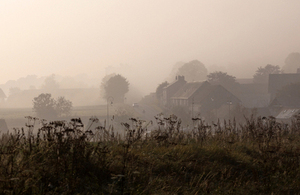Take care when picking mushrooms, poisons experts warn
Every year dozens of people all over the UK have to seek medical advice after picking and eating wild mushrooms which then make them ill.

Autumn scene
This is because some varieties which grow wild in the United Kingdom are poisonous and can make foragers ill when consumed: some types can even be fatal. Foragers should remember that the poisons in some of the most dangerous wild mushrooms are generally not destroyed by cooking.
So far this year the Public Health England commissioned National Poisons Information Service (NPIS) has been consulted for advice on 84 cases, and with the foraging season now underway the medics are sounding their warnings once again. The NPIS is contacted by frontline medics who need expert assistance when dealing with poisonings.
Dr John Thompson, Director of the NPIS unit in Cardiff, said:
As the weather starts to change many people will soon be heading out to the countryside to seek out wild food which can be a really fun thing to do.
But when it comes to wild mushrooms people really need to be aware of the very real potential dangers involved, it is always at this time of year that we see a noticeable increase in poisoning cases.
This is because while many mushrooms growing in the wild are tasty and safe to eat, it is not always easy to differentiate between toxic and non-toxic species even for people with experience in foraging.
That’s why we say that people should not eat mushrooms collected in the wild unless they are very familiar with the various types that grow in the UK and are sure that the mushrooms that they have collected are safe to eat.
In 2013 the NPIS was contacted about 237 times after people who had eaten mushrooms fell ill, and reports came to the service from every region of the UK.
Many of those involved were children under 10 who had eaten mushrooms, but some enquiries were about adults who developed illness after consuming mushrooms that they had collected in the wild. Because of the risk of severe poisoning after accidental consumption of toxic mushrooms, the NPIS experts are warning foragers to take care when picking mushrooms and only to consume those that they know to be safe to eat.
Dr John Harrison, Director of PHE’s Centre for Radiation, Chemicals and Environmental Hazards, which commissions NPIS, said:
People heading outdoors this autumn, whether it’s to gather wild mushrooms or just to enjoy the great British countryside, should be aware of the dangers that mushrooms can pose. Correctly identifying the mushrooms that are safe to pick and eat is the key to ensuring that foraging is good fun and does not endanger health.
Ends
Notes for editors
-
The National Poisons Information Service (NPIS) is a clinical toxicology service for healthcare professionals working in the NHS. It is endorsed by the Department of Health (DH) and commissioned by PHE. It has units in Birmingham, Cardiff, Edinburgh and Newcastle and provides expert evidence-based advice on all aspects of acute and chronic poisoning, supporting best practice in the diagnosis and management of patients who may have been accidentally or deliberately poisoned, whether by ingestion, injection, inhalation or skin or eye contact.
-
Public Health England exists to protect and improve the nation’s health and wellbeing and reduce health inequalities. It does this through advocacy, partnerships, world-class science, knowledge and intelligence, and the delivery of specialist public health services. PHE is an operationally autonomous executive agency of the Department of Health.
-
See the Food Standard Agency’s website for some guidance on wild food foraging.
For media enquiries, NPIS staff are available for interview, contact the CRCE press office.